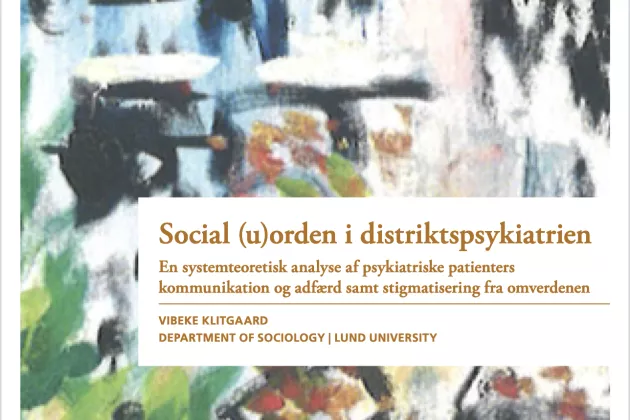Vibeke Klitgaard defended her thesis "Social (dis) order in district psychiatry: A systems theory analysis of psychiatric patients' communication and behavior as well as the stigmatization they experience from the social environment" on Tuesday 21 December 2021 in Eden's Auditorium in Lund.
The original Danish title is "Social (u)orden i distriktspsykiatrien: En systemteoretisk analyse af psykiatriske patienters kommunikation og adfærd samt stigmatisering fra omverdenen".
External reviewer during the thesis defence was Professor Astrid Helene Skatvedt from the University of South-Eastern Norway.
Examination committee:
- Associate Professor Bo Isenberg, Department of Sociology, Lund University
- Associate Professor Anette Skårner, Department of Social Work, University of Gothenburg.
- Associate Professor Karin Örmon, Department of Sociology, Lund University
The main supervisor and chair person of the defence was Henriette Frees Esholdt.
Abstract
This dissertation looks into everyday life at two day-care centres of community psychiatry in the municipality of Copenhagen. More specifically, it is about the patients' communication and behaviour, and about the stigmatization from the outer world they experience. The empirical material is based on three years of participant observation. The two daycare centres and their districts were situated in opposite ends of the socioeconomic scale within the municipality, one of them in the district of the highest socioeconomic status in the municipality, the other one in a district of very low socioeconomic status. The socioeconomic distance caused marked differences in the patients' communication and behaviour patterns, which had to do with the patients' orientation. In the day-care centre placed in the low socioeconomic status district the patients focused mainly on the patient community, whereas the patients at the day-care centre in the district of high socioeconomic status were oriented towards normality. I analyze patients’ communication and behaviour in line with the communication part of Luhmann’s systems theory approach. The patients expressed varying degrees of communication disturbances: some major, when they could not express themselves in a comprehensible way and therefore could not interact with other patients; some minor, which enabled them to interact with other patients even if they expressed for instance singular delusions. I focus on the day-care centres' double status as places of refuge and as stigmamarkers. They were places of refuge where the patients could talk freely about their symptoms and the effects of psychopharmaceuticals. However, the day-care centres were also stigma-markers because the patients were subjected to stigmatisation and moral judgment as a consequence of their mere contact with the psychiatric treatment system. The literature on stigmatisation describes how the discrimination against psychiatric patients influence their chances in more or less all life areas: Income, education, job and employment, psychological well-being, housing status, medical treatment, health and satisfactory relations. On top of the above-mentioned, psychiatric patients are at severe risk of excess mortality, as recently documented in a forensic autopsy study.


